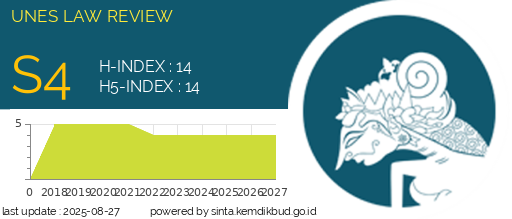Penerapan Prinsip Kehati-Hatian Sebagai Perlindungan Hukum Preventif dalam Pembuatan Akta Autentik Notaris
DOI:
https://doi.org/10.31933/unesrev.v6i2.1176Keywords:
Precautionary Principle, Notary, Legal ProtectionAbstract
The purpose of writing this article is to be able to understand and analyze the application of the precautionary principle as preventive protection in making authentic notarial deeds. This article uses a normative research type with a statutory and regulatory research approach and a conceptual approach, and uses qualitative descriptive data analysis with deductive thinking methods. The form of the precautionary principle referred to above is a principle that is not regulated and strengthened in the UUJN, which causes notaries in carrying out their duties as public officials who make authentic deeds to often encounter legal problems, such as forgery of identity letters of the parties, certificates and false statements from the parties. . In this way, the notary will be vulnerable to being caught in a crime, namely falsifying documents due to negligence or committing a criminal act due to negligence. Based on Article 50 of the Criminal Code, it confirms that "whoever commits an act to carry out statutory regulations, must not be punished." Article 50 of the Criminal Code provides legal protection for the actions of Notaries as stated in Article 48 paragraph (1) of Law no. 2 of 2014, which regulates that the contents of the Deed are prohibited from being changed, which has the implication of binding the Notary in the criminal act of Negligence
Downloads
References
Anggraeni, N., Sandra, C., & Khoiri, A. (2022). Implementasi Kebijakan Pelindungan dan Pemenuhan Hak Kesehatan Penyandang Disabilitas di Kabupaten Jember. Public Health Perspective Journal, 11(01), 1–13.
Asri, D. P. B. (2018). Perlindungan Hukum Preventif Terhadap Ekspresi Budaya Tradisional di Daerah Istimewa Yogyakarta Berdasarkan Undang-Undang Nomor 28 Tahun 2014 Tentang Hak Cipta. JIPRO : Journal of Intellectual Property, 1(1), 13–23. https://doi.org/10.20885/jipro.vol1.iss1.art2
de la Tierra, A. (2017). Con Men. Sociological Forum, 32(3), 684–686. https://doi.org/10.1111/socf.12355
Faulina, J., Halim Barkatullah, A., & Gozali, D. S. (2022). Kedudukan Hukum Akta Notaris yang menerapkan Konsep Cyber Notary di Masa Pandemi Covid-19 di Indonesia. Notary Law Journal, 1(3), 247–262. https://doi.org/10.32801/nolaj.v1i3.28
Hendra, R. (2013). Tanggungjawab Notaris Terhadap Akta Otentik Yang Penghadapnya Mempergunakan Identitas Palsu Di Kota Pekanbaru. Jurnal Ilmu Hukum, 3(1). https://doi.org/10.30652/jih.v3i01.1029
Kartika, E. D., & Laitupa, S. (2022). Government Responsibilities in Fulfilling Victims’ Rights During the Rehabilitation and Reconstruction Phase After the Earthquake in Sulai Village, Ulumanda District, Majene Regency. Musamus Law Review, 5(1), 61–71. https://doi.org/10.35724/mularev.v5i1.4593
Kartika, E. D., Yasser, F., & Laitupa, S. (2021). The existence of village regulations for development community empowerment in Padang village Polewali Mandar regency. Indonesia Prime, 6(1), 1–5. https://indonesiaprime.or.id/index.php/id/article/view/114
Ludy Hardani, A. (2021). Kewajiban Menjaga Kerahasiaan Dalam Pembuatan Akta Bagi Calon Notaris Magang. Jurnal Officium Notarium, 1(1), 174–183. https://doi.org/10.20885/jon.vol1.iss1.art18
Nasrianti, N. (2022). Perlindungan Hukum Terhadap Indikasi Geografis Menurut Undang-Undang Nomor 20 Tahun 2016 Tentang Merek Dan Indikasi Geografis. Jurnal Geuthèë: Penelitian Multidisiplin, 5(2), 177. https://doi.org/10.52626/jg.v5i2.157
Primanta, A. I. (2020). Pertanggungjawaban Pidana pada Penyalahgunaan Data Pribadi. Jurist-Diction, 3(4), 1431. https://doi.org/10.20473/jd.v3i4.20214
Downloads
Published
How to Cite
Issue
Section
License
Hak cipta :
Penulis yang mempublikasikan manuskripnya di jurnal ini menyetujui ketentuan berikut:
- Hak cipta pada setiap artikel adalah milik penulis.
- Penulis mengakui bahwa UNES Law Review berhak menjadi yang pertama menerbitkan dengan lisensi Creative Commons Attribution 4.0 International (Attribution 4.0 International CC BY 4.0) .
- Penulis dapat mengirimkan artikel secara terpisah, mengatur distribusi non-eksklusif manuskrip yang telah diterbitkan dalam jurnal ini ke versi lain (misalnya, dikirim ke repositori institusi penulis, publikasi ke dalam buku, dll.), dengan mengakui bahwa manuskrip telah diterbitkan pertama kali di Jurnal UNES Law Review.



















